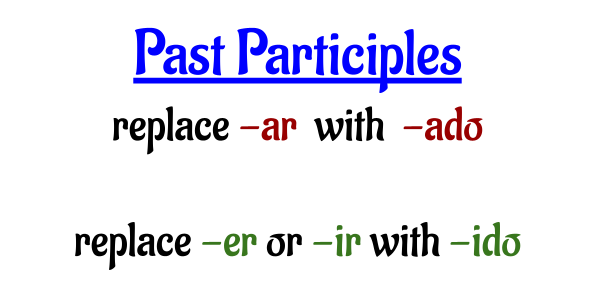Past Participles as Adjectives
How to form the Past Participle with Regular Verbs.
Past Participles serve a few functions, we are going to focus on its function as an adjective sin describing the current state of nouns.
To form the past participle of a regular ver, you drop the infinitive ending (-ar, -er, -ir) and add either -ado or -ido.
To form the past participle of a regular ver, you drop the infinitive ending (-ar, -er, -ir) and add either -ado or -ido.
Here are some examples of regular -AR verbs:
Because these are being used as adjectives, that means that they will agree with the noun that they are describing in both number (singular or plural) and gender (masculine or feminine). You will also see that we are using it in these cases with the verb estar, because we are describing the current state of the object/noun.
However, past participles can also be used regular adjectives, coming after the noun. As in these cases:
- cerrar → cerrado
- buscar → buscado
- sentar → sentado
- salir → salido
- perder → perdido
- comer→ comido
Because these are being used as adjectives, that means that they will agree with the noun that they are describing in both number (singular or plural) and gender (masculine or feminine). You will also see that we are using it in these cases with the verb estar, because we are describing the current state of the object/noun.
- La puerta está cerrada. The door is closed.
- Los estudiantes están sentados. The students are seated.
- Mi cartera está perdida. My wallet is lost.
- Las pizzas están divididas. The pizzas are divided.
However, past participles can also be used regular adjectives, coming after the noun. As in these cases:
- Las puertas cerradas The closed doors
- Los estudiantes sentados The seated students
- La cartera perdida The lost wallet
- Las pizzas divididas The divided pizzas
Irregular Past Participles
There are some irregular past participles, so these just have to be memorized. Here is an acronym to help you out: REVV MAC PHDLI
Romper (to break) → roto (broken)
Escribir (to write) → escrito (written)
Volver (to return) → vuelto (returned)
Ver (to see) → visto (seen)
Morir (to die) → muerto (dead)
Abrir (to open) → abierto (opened)
Cubrir (to cover) → cubierto (covered)
Poner (to put, place) → puesto (put, placed)
Hacer (to do, make) → hecho (done, made)
Decir (to say, tell) → dicho (said, told)
Devolver (to return something) → devuelto (returned)
Limpiar (to clean) → limpio/limpiado (clean/cleaned)
Here are some examples of these irregulars functioning as adjectives with the verb estar.
Romper (to break) → roto (broken)
Escribir (to write) → escrito (written)
Volver (to return) → vuelto (returned)
Ver (to see) → visto (seen)
Morir (to die) → muerto (dead)
Abrir (to open) → abierto (opened)
Cubrir (to cover) → cubierto (covered)
Poner (to put, place) → puesto (put, placed)
Hacer (to do, make) → hecho (done, made)
Decir (to say, tell) → dicho (said, told)
Devolver (to return something) → devuelto (returned)
Limpiar (to clean) → limpio/limpiado (clean/cleaned)
Here are some examples of these irregulars functioning as adjectives with the verb estar.
- Lo siento, el perro está muerto. Sorry, the dog is dead.
- No, la puerta está abierta. No, the door is open.
- La computadora no funciona. Está rota. The computer is not working, it is broken.
- Ya la carta está escrita. Now the letter is written.

